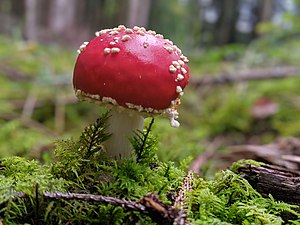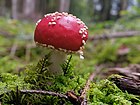Note: This is a project under development. The articles on this wiki are just being initiated and broadly incomplete. You can Help creating new pages.
Difference between revisions of "Amanita muscaria"
(Created page with "{{stub}} ==Uses== {{Uses|}}, {{Uses|}}, {{Uses|}}, {{Uses|}}, {{Uses|}}, {{Uses|}}, {{Uses|}}, {{Uses|}}, {{Uses|}}, {{Uses|}}, {{Uses|}}. ==Parts Used== {{Parts Used|}}, {{...") |
|||
| (6 intermediate revisions by the same user not shown) | |||
| Line 1: | Line 1: | ||
| − | + | [[File:Amanita muscaria 2019.jpg|thumb|right]] | |
| − | + | '''Amanita muscaria''' is a variable species with several color varieties recognized. The cherry red form is not frequently found in North Carolina. Fruiting bodies may reach nearly 12 inches in diameter and 6-8 inches high. | |
==Uses== | ==Uses== | ||
| − | {{Uses|}}, {{Uses| | + | {{Uses|Sore throats}}, {{Uses|Arthritis}}. |
==Parts Used== | ==Parts Used== | ||
| Line 8: | Line 8: | ||
==Chemical Composition== | ==Chemical Composition== | ||
| − | <ref name="chemical composition"/> | + | THE fungus Amanita muscaria has been the object of intensive investigations for many years, and two of its constituents, muscarine and acetylcholine, are of fundamental importance in pharmacology. The elucidation of the structure of muscarine in the classical researches of Kögl et al.1<ref name="chemical composition"/> |
==Common names== | ==Common names== | ||
| Line 59: | Line 59: | ||
==Photo Gallery== | ==Photo Gallery== | ||
<gallery class="left" caption="" widths="140px" heights="140px"> | <gallery class="left" caption="" widths="140px" heights="140px"> | ||
| − | + | File:Amanita muscaria 2019.jpg|Zollernalbkreis, Germany | |
| + | File:Fly Agaric mushroom 04.jpg|{{FP star}} New Zealand | ||
| + | File:Amanita muscaria qtl4.jpg|{{FP star}} Biggesee, Sauerland, Germany | ||
| + | File:Amanita-muscaria-fliegenpilz-b.jpg|{{QI seal}} Southern Germany, Ulm. | ||
| + | File:Amanita muscaria 2014.JPG|Catalunya. | ||
</gallery> | </gallery> | ||
| Line 65: | Line 69: | ||
<references> | <references> | ||
| − | <ref name="chemical composition">[ | + | <ref name="chemical composition">[https://www.nature.com/articles/2061359a0 Constituents]</ref> |
<ref name="Leaf">["morphology"]</ref> | <ref name="Leaf">["morphology"]</ref> | ||
| Line 73: | Line 77: | ||
==External Links== | ==External Links== | ||
| − | * [ ] | + | * [http://powo.science.kew.org/taxon/urn:lsid:indexfungorum.org:names:161267 Amanita muscaria on kew.org] |
| − | * [ ] | + | * [https://www.fs.fed.us/wildflowers/ethnobotany/Mind_and_Spirit/flyagaric.shtml Amanita muscaria on wildflowers.us] |
| − | * [ ] | + | * [https://thethirdwave.co/amanita-muscaria-the-fairy-tale-shroom/ Amanita muscaria on thethirdwave.co] |
| + | * [http://www.sacredearth.com/ethnobotany/plantprofiles/flyagaric.php Amanita muscaria on sacredearth.com] | ||
[[Category:Herbs]] | [[Category:Herbs]] | ||
| + | [[Category:Pages without herbs images]] | ||
Latest revision as of 19:38, 23 July 2020
Amanita muscaria is a variable species with several color varieties recognized. The cherry red form is not frequently found in North Carolina. Fruiting bodies may reach nearly 12 inches in diameter and 6-8 inches high.
Contents
- 1 Uses
- 2 Parts Used
- 3 Chemical Composition
- 4 Common names
- 5 Properties
- 6 Habit
- 7 Identification
- 8 List of Ayurvedic medicine in which the herb is used
- 9 Where to get the saplings
- 10 Mode of Propagation
- 11 How to plant/cultivate
- 12 Commonly seen growing in areas
- 13 Photo Gallery
- 14 References
- 15 External Links
Uses
Parts Used
[[:Category:Herbs with used in medicine|]], stem, leaves, Root.
Chemical Composition
THE fungus Amanita muscaria has been the object of intensive investigations for many years, and two of its constituents, muscarine and acetylcholine, are of fundamental importance in pharmacology. The elucidation of the structure of muscarine in the classical researches of Kögl et al.1[1]
Common names
| Language | Common name |
|---|---|
| Kannada | |
| Hindi | |
| Malayalam | |
| Tamil | |
| Telugu | |
| Marathi | |
| Gujarathi | |
| Punjabi | |
| Kashmiri | |
| Sanskrit | |
| English |
Properties
Reference: Dravya - Substance, Rasa - Taste, Guna - Qualities, Veerya - Potency, Vipaka - Post-digesion effect, Karma - Pharmacological activity, Prabhava - Therepeutics.
Dravya
Rasa
Guna
Veerya
Vipaka
Karma
Prabhava
Habit
[[:Category:Habit - |]]
Identification
Leaf
| Kind | Shape | Feature |
|---|---|---|
Flower
| Type | Size | Color and composition | Stamen | More information |
|---|---|---|---|---|
| {{{5}}} |
Fruit
| Type | Size | Mass | Appearance | Seeds | More information |
|---|---|---|---|---|---|
Other features
List of Ayurvedic medicine in which the herb is used
Where to get the saplings
Mode of Propagation
[[:Category:Index of Plants which can be propagated by |]]
How to plant/cultivate
Commonly seen growing in areas
[[:Category:Herbs that are commonly seen in the region of |]], [[:Category:Herbs that are commonly seen in the region of |]], [[:Category:Herbs that are commonly seen in the region of |]], [[:Category:Herbs that are commonly seen in the region of |]], [[:Category:Herbs that are commonly seen in the region of |]].
Photo Gallery
Template:FP star New Zealand
Template:FP star Biggesee, Sauerland, Germany
Template:QI seal Southern Germany, Ulm.
References
- ↑ Constituents
- ↑ ["morphology"]
- ↑ [ "Cultivation"]
External Links
- Ayurvedic Herbs known to be helpful to treat Sore throats
- Ayurvedic Herbs known to be helpful to treat Arthritis
- Herbs with used in medicine
- Herbs with stem used in medicine
- Herbs with leaves used in medicine
- Herbs with Root used in medicine
- Habit -
- Index of Plants which can be propagated by
- Herbs that are commonly seen in the region of
- Herbs
- Pages without herbs images





